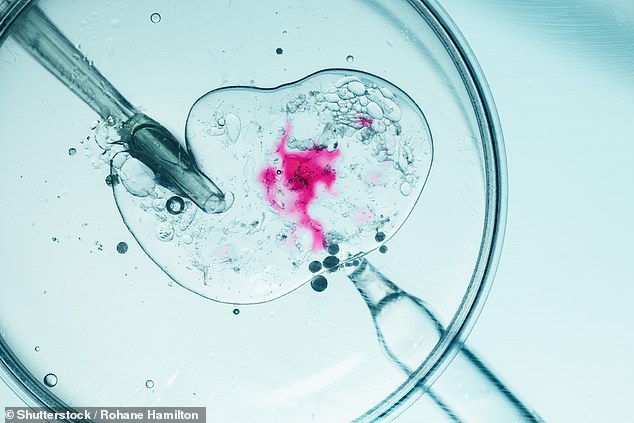Babies born through IVF are up to twice as likely to suffer life-threatening heart defects, a major study has found.
Those conceived through assisted reproductive technology, such as in vitro fertilization (IVF), are significantly more likely to suffer from congenital heart problems.
This risk increases even more if twins are born, according to research in which more than 7.7 million people participated.
Experts said the discovery could help doctors make diagnoses faster, since babies often require immediate surgery.
The researchers studied the medical records of all children born alive in Denmark, Finland, Norway and Sweden over a period spanning 20 to 31 years.
Babies born through IVF are up to twice as likely to suffer life-threatening heart defects, major study finds

Those conceived through assisted reproductive technology, such as in vitro fertilization (IVF, pictured close up), are significantly more likely to suffer from congenital heart problems.

Heart defects were about 36 percent more common in babies born after assisted reproduction, compared with babies conceived naturally.
They compared data on babies born after assisted reproduction, including IVF, intracytoplasmic sperm injection (ICSI) and embryo freezing, with data on babies conceived naturally.
They assessed how many live-born children in each group were diagnosed with a major heart defect or a severe heart defect, either in utero or in the first year of life.
Factors such as the child’s year of birth, the country of birth, the mother’s age at the time of birth, whether the mother smoked during pregnancy, or whether the mother had diabetes or heart defects were taken into account.
Heart defects were about 36 percent more common in babies born after assisted reproduction, compared with babies conceived naturally, with a similar risk regardless of the type used.
Twins or other multiple birth babies were more than twice as likely to have a major heart defect as the rest of the population, at 2.47 and 1.15 percent, respectively.
Scientists said the findings, published in the peer-reviewed journal Heart, may indicate that there is some common factor underlying infertility in parents and congenital heart disease in their babies.
Professor Ulla-Britt Wennerholm, from the University of Gothenburg, Sweden, said: “Congenital heart defects can be extremely serious and require specialist surgery when babies are very young, so knowing which babies are most at risk can help us diagnose heart defects as early as possible. possible and ensure that appropriate care and treatment is provided.
“More and more people are conceiving with the help of assisted reproductive technology, so we could expect to see an increase in cases of congenital heart defects around the world.”
Almost 400,000 have been born in the UK through IVF since 1991, according to the Human Fertilization and Embryology Authority.
Scientists said it was important for couples undergoing the procedure to be aware of the potential risks, such as other birth defects or a lower birth rate.
In an accompanying editorial, Dr. Nathalie Auger, of the University of Montreal Hospital Research Center in Canada, said: “While the majority of newborns born after assisted reproductive technology are healthy, these procedures do not They are risk-free.
He added: ‘Patients using assisted reproductive technology tend to differ from the general population.
“These patients may have underlying morbidities that affect both fertility and risk of heart defects.”


